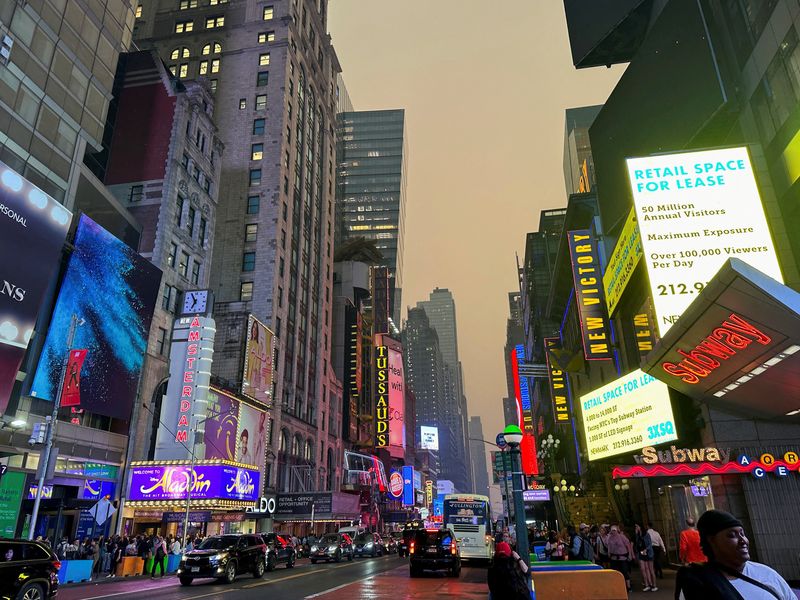
[ad_1]

© Reuters. Times Square in Manhattan is shrouded in haze and smoke which drifted south from wildfires in Canada, in New York City, New York, U.S., June 6, 2023. REUTERS/Maye-E Wong
2/2
By Ismail Shakil and David Ljunggren
OTTAWA (Reuters) – Hundreds of uncontrolled forest fires blazed across Canada on Wednesday, threatening critical infrastructure, forcing evacuations and sending a blanket of smoky air wafting over U.S. cities.
Wildfires are common in Canada’s western provinces, but this year flames have mushroomed rapidly in the country’s east, making it the worst-ever start to the season.
About 3.8 million hectares (9.4 million acres) have already burned, some 15 times the 10-year average, said Federal Minister of Emergency Preparedness Bill Blair.
“Across the country as of today, there are 414 wildfires burning, 239 of which are determined to be out of control,” he told a briefing. The giant eastern province of Quebec is among the worst affected.
“We’ve … seen continued impacts to critical infrastructure in Quebec such as roads and rural closures, telecommunication interruptions and high voltage power lines being threatened by the growing fires,” said Blair.
Quebec Premier Francois Legault earlier said the province was able to fight 40 fires at the same time.
“But we have 150 fires so we have to make sure that we focus where the problems are the more urgent,” he told reporters.
Canadian Prime Minister Justin Trudeau said he spoke with U.S. President Joe Biden by phone on Wednesday to thank him for “critical support” in tackling the blazes. Hundreds of U.S. firefighters have already arrived in Canada and more are on their way.
“We’re seeing more and more of these fires because of climate change. These fires are affecting everyday routines, lives and livelihoods, and our air quality,” Trudeau said in a statement on Twitter.
South of the border, more than a dozen U.S. states were under air-quality alerts on Wednesday as smoke from the wildfires wafted south.
An unusually early and intense start to wildfire season has set Canada on track for its worst-ever year of fire destruction as warm and dry conditions are expected to persist for months.
“In coming years we will have to reflect seriously on how we can equip ourselves to deal with this new reality. We will be facing more and more extreme weather events that will cost us a lot more,” Prime Minister Justin Trudeau told the briefing.
About 520 firefighters were battling the blazes with another 150 due to join soon from the army, Legault said. He said he hoped 500 more would arrive in the next few days from the neighboring province of New Brunswick (NYSE:) as well as France, the United States, Portugal, Spain, and Mexico.
Residents of the towns of Chibougamau and Ouje-Bougoumou in northern Quebec received evacuation orders Tuesday night, becoming the latest group of people in the province to evacuate homes after thousands were forced out last week.
Around 11,400 people have been evacuated so far from remote parts of northern Quebec and another 4,000 will be evacuated soon, Legault said.
In neighboring Ontario province, Canada’s most populous, deteriorating air quality has been forecast this week in cities including Ottawa and Toronto due to smoke plumes.
[ad_2]